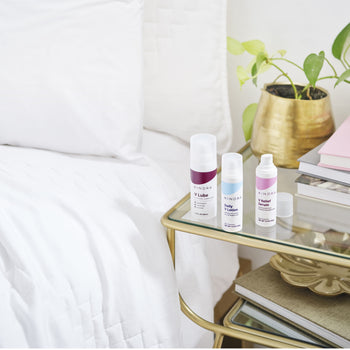Essential Takeaways
During menopause, when our estrogen decreases, our collagen breaks down. It results in our skin getting thinner, which means it’s more susceptible to burning and sun damage (i.e. brown spots).
To support skin and collagen, you can use Retin-A or take collagen orally.
As for getting out in the sun, Dr. Markowitz says that “in menopausal skin, layering is key.” She recommends moisturizer, primer mineral sunscreen & tinted sunscreen.
3 things to understand about skin during menopause, 2 at-home ways to support it, and 1 easy trick to protect skin in the sun.
To understand the “why” behind our changing skin in menopause and get tips on how to protect it in the sun, we asked Dr. Orit Markowitz — leading dermatologist, skin cancer specialist, and CEO and Founder of OptiSkin, which she recently opened after practicing many years at Mount Sinai hospital in NYC.
So, why does our skin change?
- Collagen is the most abundant protein in our bodies. It’s in our bones, muscles, blood, and skin. It essentially provides a “scaffold” effect to provide strength and structure, holding our body together.
- During menopause, when our estrogen decreases, our collagen breaks down. That’s why our skin sags, wrinkles, and becomes less glowy and dewy. The “scaffold” is no longer as strong.
- The breakdown of collagen as we go through menopause also results in our skin getting thinner, which means it’s more susceptible to burning and sun damage (i.e. brown spots). Speaking of burning, even if you’ve never had a sunburn, the sun’s UVA rays also cause a breakdown of collagen.
A lot is happening to collagen, but Dr. Markowitz says there are two easy things you can do at home to support skin and collagen.
- Retin-A is proven to help skin become thicker over time if used consistently. You can talk to your doctor about a prescription Retin-A, or you can look for over-the-counter products with retinol. Note: Retin-A can make your skin more sensitive in the sun.
- Dr. Markowitz says there are now studies that show that taking collagen orally can improve collagen in the body.
As for getting out in the sun, Dr. Markowitz says that “in menopausal skin, layering is key.”
Here is her 3-step plan to staying safer in sun.
- Moisturizer: Maturing skin is often dryer so a moisturizer not only helps that, but can also give skin the appearance of being plumper and glowy. So layer one is a moisturizer. For summer, look for a moisturizer with humectants (i.e. salicylic acid or alpha hydroxy) to absorb water, while in winter look for a moisturizer with sealants to lock in moisture.
- Primer mineral sunscreen: Using a protective mineral sunscreen is ideal because as Dr. Markowitz points out, “the benefit of mineral sunscreen is that it works right away, so you don’t have to wait 20 minutes for it to be effective.” One of her go-to’s is Blue Lizard.
- Tinted sunscreen: While this layer isn’t a “must,” a tinted sunscreen will give you a sunkissed look - the kind you’re going for, but without the baking-in-the-sun part.














I like your skin tips. I have a persistent rash. I’ll have to see a dermatologist. https://www.regencyspecialties.com/dermatology/medical-dermatology/eczema/
— Tex Hooper